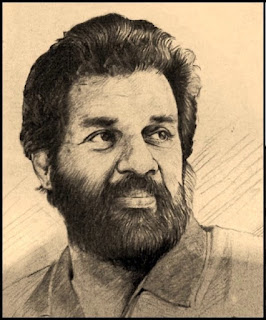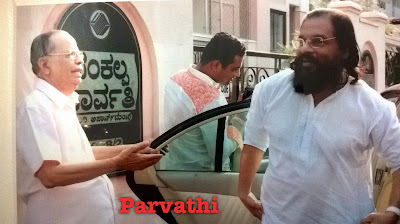Friends and mutual admirers: Yesudas, Srikantiah, Vishnuvardhan, Bharati
Vidwans (L to R): Guruvayoor Dorai, Yesudas, Mysore Manjunath
During January 2013, the media is full of news about the Kumbh Mela, a conclave where several million people are going to visit the holy confluence of Ganga, Yamuna and Saraswati rivers at Allahabad for a dip during this auspicious period and to get blessings of holy men, as ordained in the Puranas. Both BBC and the Harvard School have taken interest in documenting this great human congregation. Perhaps no less in magnitude and complexity is the human phenomenon of the Sabarimala annual pilgrimage, which just ended this month.
We reproduce information from several sources:
The shrine of Sabarimala is one of the most remote shrines in southern India and yet it draws three to four million pilgrims each year. Surrounded by mountains and dense forests, Sabarimala is believed to be the place where Lord Ayyappan meditated. The pilgrimage begins in the month of November and ends in January. Certain customs are to be strictly observed if one has to undertake a pilgrimage to Sabarimala. A pilgrim attending the Mandalapooja should observe austerities for 41 days.

Harivarasanam is a devotional song composed in the astakam metre, recited at Sabarimala before closing the temple door every night. The song was written by Kambangudi Kulathur Srinivasa Iyer and was recited the first time by Swami Vimochanananda at the temple. Though there have been many versions of this song sung by many renowned vocalists, the Sabarimala temple plays the rendition by K. J. Yesudas of a musical version composed by the renowned music director G. Devarajan every evening after the final pooja.
The story goes that VR Gopala Menon, from Alapuzha used to accompany Thirumeni Eashwaran Namboothiri, the Melshanthi (head priest), to Sannidhanam every time, and would stay there by himself even when the temple was closed, remaining undisturbed by the wild animals. Later, when the Devaswom Board was formed, it is believed that he was asked to move out. He eventually died at a tea estate at Vandiperiyar.
Gopala Menon used to recite Harivarasanam with devotion during his time at Sannidhanam, and the news of his passing away deeply saddened Thirumeni Eashwaran Namboothiri. Once, at the end of the day's rituals, the Namboothiri was about to close the doors of the Sannidhanam when he remembered the dedication and sacrifice of Gopala Menon and he then began to recite Harivarasanam starting a nostalgic tradition that remains unbroken till date. Today, as the final verses are being sung, all the assistant Santhis (priests) leave the Sreekovil one by one. As the song ends, only the Melsanthi is inside. He extinguishes the lamps one at a time and closes the doors for the night.
It is interesting that this song Harivarasanam challenges the usual stereotypes in Carnatic music. It is associated with a lesser known Hindu deity, Hari-Hara putra Ayyappan. His temple is in a remote forest in Kerala. Harivarasanam has been set to tune by G. Devarajan, who was a self-confessed Communist/agnostic. It has been sung by K. J. Yesudas, who is not from the typical Tamil Brahminical mould. And yet it has moved millions for a long time, and is broadcast in the Sabarimala temple every day in Yesudas’s voice.
Thus, Vid. K. J. Yesudas, one of the most gifted, recognised and honoured musical voices in Indian cinema, should also be recognised as the voice that immortalised Harivarasanam .
Mr. K. Srikantiah’s close friend for many years, Sri Yesudas has come and performed in Parvathi on more than 20 occasions, to large crowds of eager fans. In the 2007 concert we feature here, his energy and enthusiasm is undiminished at 67 years. He sings a large number of his hugely popular numbers, both classical pieces and film songs. In fact, the Kannada matinee idol Mr. Vishnuvardhan (featured in the photo with Mr. Srikantiah, Mr. Yesudas and Mrs. Bharati Vishnuvardhan, another famous film star) sat through this concert, and enjoyed the song “Ellellu Sangeethave” from his hit movie Malaya Marutha, sung by Sri Yesudas!
Sri Yesudas turns nostalgic in the middle of the concert and narrates how his father (his first guru) was a famous theatre artiste and sang at an impossibly high pitch and with unbelievable felicity in the higher octave in the days when there were no mikes. He explains how being totally surrendered to the guru and learning from the masters in person as well as continual, rigorous practice are crucial to one’s progress as a musician. He cautions youngsters that they should never imagine that there is a short cut to success by merely learning music from tape recordings. He says his success is entirely due to his father’s and gurus’ blessings and encouragement.
We get also an insight into the spiritual appeal of Sri Yesudas’s music when he explains how he feels the godhead in every phrase of his music and how God pervades all beliefs and faiths equally.
We are happy to share such a lovely concert with excellent recording quality during the Sabarimala season.
[ Text due to R. Sachi ( click ) ]
CONCERT DETAILS: Ramanavami festival, 29 March 2007
K.J. Yesudas – Vocal
Mysore Manjunath – Violin
Guruvayoor Dorai – Mridangam
GS Ramanujam – Ghatam
Song List
01. Sarasija Nabha – Varnam _ Nata – Palghat Parameshwara Bhagavatar *** 02. Adiyali Gajamukhana Archisu – Hamsadhwani – Purandara Dasa *** 03. Guruvina Gulama – Hamsanandi – Purandara Dasa*** 04. Ela Nee Dayarada – Athana – Thyagaraja *** 05. Rama Sadguna – Todi- Jagannathadasa*** 06. Ragasudharasa – Andolika – Thyagaraja *** 07. Enduku Peddala – Shankarabharana – Thyagaraja *** (followed by Tani) *** 08. Brochevarevarura – Khamaj – Mysore Vasudevachar ***09. Dasadasara maneyadasa- Hindola – Kanakadasa *** 10. Thiruparkadalil Pallikondaye – Bhairavi – G. Devarajan ***11. Ellellu Sangeethave – Saramathi – Vijayabhaskar *** 12. Krishna Diwani Meera – Bhajan – Ravindra Jain *** 13. Enu Vara Bedali Nanu *** 14. Oru Neram - Dwijavanti *** 15. Speech *** 16. Swami sangeethadindolise – Abheri *** 17. Harivarasanam – Madhyamavati - Kambangudi Kulathur Srinivasa Iyer+G. Devarajan *** 18. Mangaladarshanadayike Mookambike ***19. Agre Pashyami, Yogindranam – Narayaneeyam *** 20. Mangalam ***
Please scroll down and up using side vertical slider:








-WP_20150106_005.jpg)









